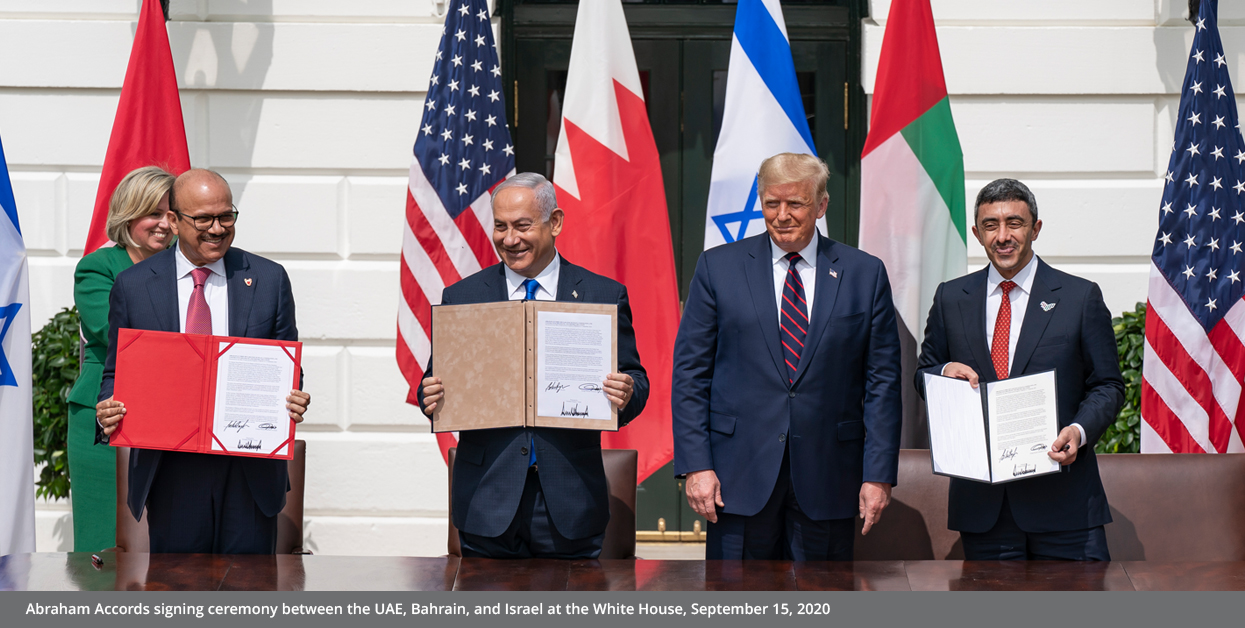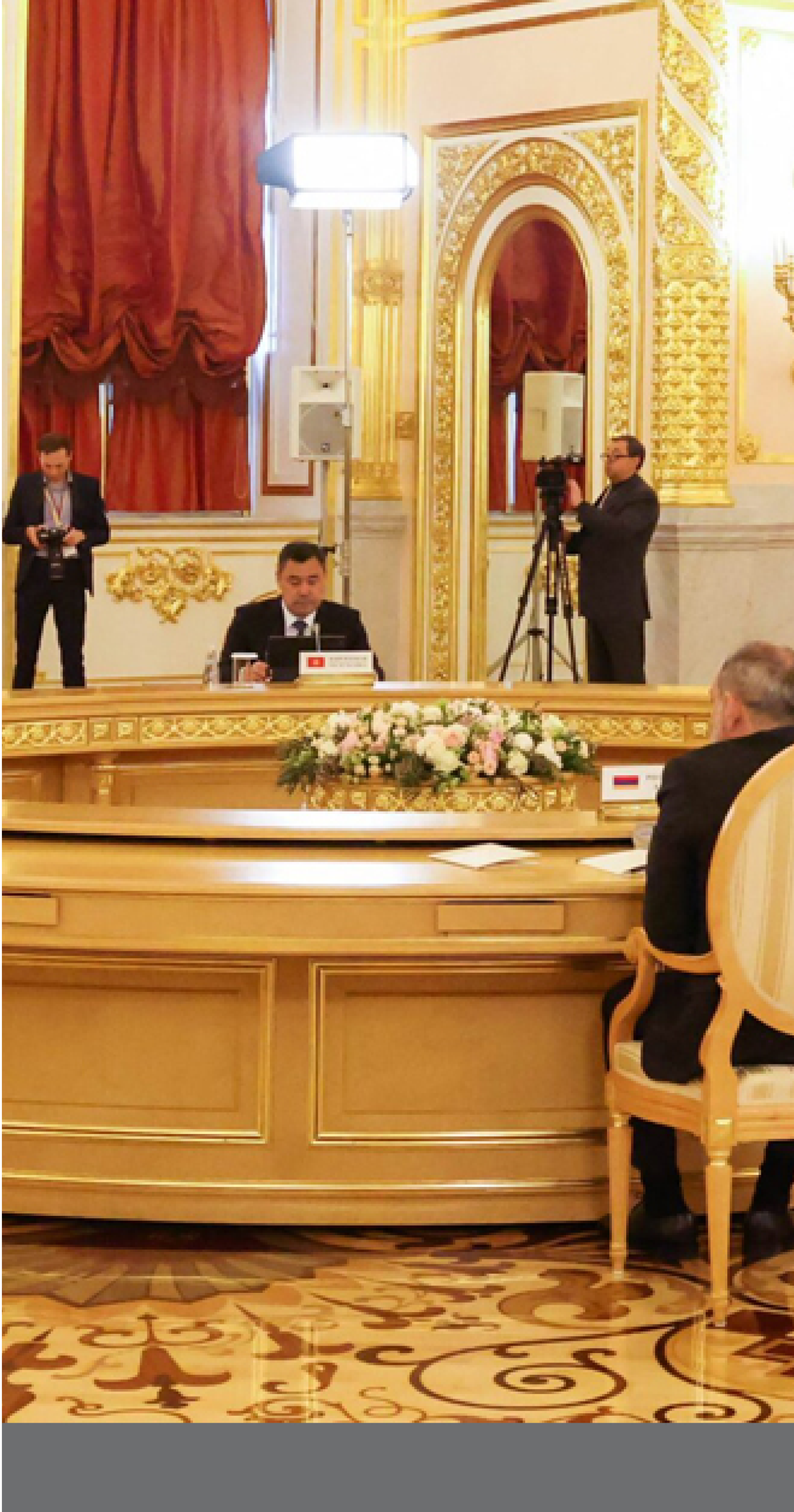A senior UAE official's warning about escalating tensions between China and the United States may reflect the grave concern in the Gulf region regarding the potential repercussions of the growing competition between the two superpowers on the interests of countries allied with the United States, most notably the United Arab Emirates and Saudi Arabia, while, at the same time, are making strategic partnerships with China.
“We’re all worried, very much, by a looming Cold War,” UAE presidential diplomatic adviser Anwar Gargash said in October 2021 at the 14th edition of the World Policy Conference in the Emirati capital, Abu Dhabi. “That is bad news for all of us because the idea of choosing is problematic in the international system, and I think this is not going to be an easy ride.”
In this paper, we attempt to shed light on the causes and contexts of Emirati concerns, and to illustrate how the Emirati-American relations are different from the relationship between the UAE and China. In addition, the paper highlights how the intensified competition between the two biggest economies in the world will affect the UAE, and what possible scenarios may affect Abu Dhabi's positions and policies in the coming period regarding what Abu Dhabi considers “bad news” if it had to “choose” between the two giants.
The nature of relations between the United Arab Emirates and the United States
The decades long warm relations between the UAE and the United States can be described as a “comprehensive geo-security” relationship. This description was much more clearly demonstrated after the second Gulf War of 1991, and has deepened further in the 2000s and 2010s.
Indeed, the UAE will rely on American protection, support and weapons in case a conflict arises, as it considers the alliance with the world's greatest power one of the key pillars of its security, stability, and prosperity, extending its interests, as well as achieving its ambitions to seize an important place on the regional map.
In return, the United States considers the UAE one of its most key allies in the MENA region, and it is therefore a fundamental basis for the American policy in the region whether by:
1. the UAE’s participation in every major US mission in the wider Middle East since the Second Gulf War, military operations in Somalia in 1992, as well as in Kosovo in 1999, in Afghanistan (since 2003 until it recently helped evacuate American and Western troops), in Libya in 2011, in Yemen (by Fighting Al-Qaeda in Hadhramaut and Mukalla), and in Syria against ISIS (2014-2015);
2. cooperation with Washington in combating terrorism, extremism and organized crime;
3. countering elements that pose a threat to regional stability, primarily Iran and its proxies, including armed groups and militias; and
4. the UAE's role in protecting international waterways, fighting piracy in the Horn of Africa, and ensuring smooth flow of energy to international markets in Europe and Asia.
American officials describe the UAE as “the force of moderation and stability in one of the most turbulent regions in the world”. This may have taken on broader dimensions and horizons after the UAE-Israel peace treaty, also known as Abraham Accords, was signed on September 15, 2020 at the White House under the auspices and support of former US President Donald Trump. And his successor, Joe Biden, has also pledged that his administration will adhere to the agreement and call for its expansion.

UAE's strategic partnership with China
The priorities of GCC oil-producing countries have changed since former President Barack Obama's second term in office (2012-2016), mainly due to the United States' self-sufficiency in energy sector. In 2019, for example, the UAE exported 93% of its crude oil to Asia, according to the US Energy Information Administration. Therefore, Abu Dhabi places more importance on the energy security strategies of its Asian partners than those of the United States and Europe, at least from a purely economic standpoint.
The commercial partnership between the UAE and China has grown steadily over the past decade, culminating in signing of a “Comprehensive Strategic Partnership” with China in 2018. Hence, the UAE became the first Arab country to establish a strategic partnership with Beijing. In the same year, Khaldoon Khalifa Al Mubarak, the CEO of Abu Dhabi's sovereign fund, Mubadala, was appointed as the first Emirati presidential envoy to China. For its part, China appointed Yang Jiechi, a former foreign minister and member of the Central Committee of the Chinese Communist Party, as Xi Jinping's special representative to the UAE.
The strategic partnership between the UAE and China has deepened for several reasons, including:
1. Among the Gulf Cooperation Council (GCC) countries, the UAE is Beijing's primary trading partner and accounts for c.28% of non-oil trade between China and the Arab world.
2. According to experts, the most significant development in the bilateral partnership between the UAE and China was the decision to allow "Cosco Shipping" to acquire 90% of one of the terminals at Khalifa Port in Abu Dhabi. This is an unusual move by Gulf business standards, especially since local companies typically retain 50% of ownership. This move demonstrates the extent to which the UAE is positioning itself as China's gateway into the Gulf under the Belt and Road Initiative (BRI), especially following Chinese President Xi Jinping's visit in July 2018. Following that visit, a high-level UAE delegation attended the Second Belt and Road Forum for International Cooperation in April 2019.
3. China's rapid and remarkable technological development is a major factor driving trade and investment partnerships with the Gulf countries, especially the highly advanced technological solutions provided by artificial intelligence and 5G, which, so far, have not been matched by American or European alternatives.
4. There are thousands of Chinese companies operating in the UAE.
5. The first Chinese language school in the region was established in Abu Dhabi in 2010, followed by the Confucius Institute at the University of Dubai, a non-profit institution that meets the needs of those who wish to learn Chinese. Moreover, dozens of Emirati public schools now offer Chinese language classes.
6. The UAE was one of the most prominent countries to pursue “vaccine diplomacy” to counter the Covid-19 pandemic, and to use the Chinese vaccine, “Sinopharm”.
7. As the global debate on climate change and carbon neutrality intensifies, the UAE recognizes the importance of its relationship with China to drive this agenda forward. This was emphasized by the UAE Minister of Foreign Affairs and International Cooperation, Abdullah bin Zayed, at the high-level meeting in June 2021 on international cooperation under the Belt and Road Initiative, by saying: “The UAE believes in the importance of its cooperation with China, the Belt and Road Initiative and the Asian-Pacific countries as a key incentive to advance the climate change agenda.”
What makes the UAE concerned?
UAE's relationship with Washington undeniably remains of the utmost strategic importance, and it is given the greatest priority and resources, while relations with China does not engage at the core of the UAE's geo-strategic and geo-security dimensions. However, it appears that the UAE believes, based on statements of its officials, that it is difficult to ignore the second largest economy in the world, that has a global initiative called “Belt and Road”, in which the UAE as well as other Gulf countries are actively participating, in a win-win situation. Even if the UAE's relationship with China is “precautionary and is based on commercial advantages, as well as the absence of an American alternative (like the 5G technology), or due to obstacles to accessing the American alternative (such as the Arab coalition's use of Chinese drones in Yemen), it reinforces the conviction that it is difficult for the UAE to break off its beneficial ties with China. Therefore, Anwar Gargash's words, which we quoted at the beginning of this paper, can be read in this context.
“The world order that is emerging in the 21st century is likely to be multi-layered or multi-dimensional,” according to the Russian thinker, Dmitri Trenin, in an analysis published by The Economist last month. “China and America will probably stay as the only two superpowers, but each will not command their part of the world in the way that leaders in Washington and Moscow did in the second half of the last century,” Trenin added. “Instead, different sets of players—including occasionally non-state actors—will wield influence in various functional areas and geographic regions,” he concluded.
Things are not so smooth, however, because of the UAE's relations with China and its security guarantees regarding the F-35, both of which have been raised by many US senators.
“Gulf Arab states should consider their relationship with the United States when dealing with China,” said U.S. Assistant Secretary of State for Near Eastern Affairs David Schenker in May 2021. “These (Gulf) states have to weigh the value of their partnership with the United States, because there are concerns about the participation of Chinese firm Huawei in building part of the 5G infrastructure in the Gulf, which hosts the U.S. Navy’s Fifth Fleet and the largest American military base in the region.”
For his part, the commander of the US Central Command, Frank McKenzie, expressed his “satisfaction with the measures taken by the UAE” in this regard.
In a statement before US lawmakers in December 2020, UAE ambassador to Washington, Yousef Al-Otaiba, said that “the description of the UAE [by some Congress members] as having ‘very close, active defense partnerships with both China and Russia’ is a gross overstatement. The UAE has economic & diplomatic relationships with both and has only made purchases from each when the US could not supply critical equipment.” In any case, Otaiba added, “We would rather have the best US-equipment or we will reluctantly find it from other sources, even if less capable. To sum up, the US is the UAE’s security partner of choice.”
In any case, the geopolitical competition between the United States and China is testing the waters of the oil-rich Gulf states. And despite decades of close cooperation with the United States, including military and defense agreements, China has emerged as an economic counterweight to America and is now the biggest buyer of crude oil from the Gulf. “This is going to be a big challenge for all of us,” Gargash said commenting on this issue. “For us here in the UAE, the United States is our predominant strategic partner but China is our number one or two -- with India -- economic partner,” he added. “China will continue to be extremely important,” Gargash continued. “While America’s direction is something you can glean from various readings and conferences and discussions, understanding China’s direction, I think, is more opaque,” he added.
.jpg-%D9%85%D8%A7-%D8%A7%D8%B3%D8%A8%D8%A7%D8%A8-%D8%A7%D9%84%D9%82%D9%84%D9%82-%D8%A7%D9%84%D8%A7%D9%85%D8%A7%D8%B1%D8%A7%D8%AA%D9%8A.jpg)
Possible Scenarios
The first scenario: Agreement between the UAE and Washington on a longer period and a practical alternative
The United States asked the UAE to remove Huawei equipment from its networks within the next four years, before the scheduled delivery of 50 F-35s between 2026 and 2027, but Emirati officials have replied that they’d need “longer plus an alternative that’s as affordable,” according a report by Bloomberg.
That is, if an American alternative to Chinese 5G technology is available, the dilemma will be resolved, even if it takes two or three years.
Apparently, this scenario depends on the UAE's assessment that China will never be a security guarantor for the Gulf, but is useful in many other ways. China has been one of the UAE's major trade partners. The UAE's trade with China in 2019 reached about $50 billion, more than twice as much as its trade with the United States.
“We [in the UAE] need to be able to test and experiment with technologies with everyone and decide what’s really the most useful and safe and commercial for us,” Khaldoon Al Mubarak, the chief executive of Abu Dhabi wealth fund Mubadala Investment Company told former U.S. Treasury Secretary Hank Paulson in May 2021. Any replacement has to be “a competitive alternative, not just from a price perspective but also from a technology perspective,” he added.
The second scenario: Taking an approach similar to the Israeli case regarding Chinese technologies
This scenario means that if the US-Chinese "cold war" continues to escalate and expand, then Washington's allies in the region will face greater pressure to define and limit their relationship with China, as soon as possible, to trade and investments, and away from security and military relations, as well as sensitive technologies. It also expects the United States to have the same strict approach with the Gulf states as it had with Israel, requesting from the latter to prohibit Chinese companies from participating in Israeli infrastructure projects, which are likely to give Beijing access to sensitive assets, information, equipment and technologies.
In this regard, the American website, Al-Monitor, published an analysis reporting that Assaf Orion, the senior research fellow at the Institute of National Security Studies and director of its research program on Israel-China relations, claims that: “the [Bennett-Lapid] government is changing Israeli policy on China after more than a decade of former Prime Minister Benjamin Netanyahu encouraging China's entry to the Israeli market despite American urgings of caution. The Biden administration has sharpened its tone versus the Chinese and considers them a strategic threat.”
“If Israel is forced to choose between the two, it will clearly choose the United States,” said the American website, “Israel is likely to remain aligned with its closest ally,” they added.
The UAE will likely feel uneasy about the second scenario, and if it is to choose between the two, it will probably choose the first one due to its greater relative advantages, even if it does not match the current situation. Hence comes Gargash’s comment that “the idea of choosing is problematic in the international system, and I think this is not going to be an easy ride.”
The opinions expressed in this study are those of the author. In no way does Strategiecs take responsibility for the views and positions of its author on security, economic, political, social, and other issues, and such views and/or positions do not reflect those of Strategiecs.
Keep in touch
In-depth analyses delivered weekly.

Related Analyses:







.jpg-%D8%A7%D8%A7%D9%84%D8%A7%D9%85%D8%A7%D8%B1%D8%A7%D8%AA-%D8%A7%D9%84%D8%B5%D9%8A%D9%86.jpg)
